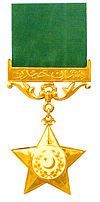Rana Shabbir Sharif
|
Major Rana Shabbir Sharif Nishan-e-Haider |
|
|---|---|
| Native name | Rana Shabbir Sharif |
| Born | 28 April 1943 Kunjah, Gujrat District, British Raj |
| Died | 6 December 1971 (aged 28) Okara District, Punjab, Pakistan |
| Allegiance |
|
| Service/branch |
|
| Years of service | 1964–1971 |
| Rank | Major |
| Unit | 4 Frontier Force Regiment |
| Battles/wars |
Indo-Pakistani War of 1965 Indo-Pakistani War of 1971 |
| Awards |
Sitara-i-Jur'at Sword of Honour |
| Relations |
General Rana Raheel Shareef (brother) Raja Aziz Bhatti (Uncle) |
| Nishan-e-Haider Award Recipient | |
|---|---|

Shabbir Sharif was recipient of the Nishan-e-Haider Award
|
|
| Date | 1971 |
| Country | Islamic Republic of Pakistan |
| Presented by | Zulfiqar Ali Bhutto |
Rana Shabbir Sharif (28 April 1943 – 6 December 1971), was a Pakistani Army officer who was killed in Indo-Pakistani War of 1971 and was awarded Nishan-e-Haider for his actions. He is the only person ever who received both the Nishan-e-Haider and Sitara-e-Jurat for his bravery. He is regarded as the most decorated officer of Pakistan Army.
He was born on 28 April 1943 in a Rajput family at Kunjah, Gujrat District to Major Rana Muhammad Sharif. Sharif Completed his Matric from St. Anthony's High School, Lahore and while he was at Government College Lahore that he received a call to join Pakistan Military Academy (PMA) Kakul.
He used to play squash and won Army level swimming medal while he was in 4th Frontier Force Regiment.
He was commissioned in Pakistan Army on 19 April and after successfully completing his training, after which he was awarded the Sword of Honor, he was posted to the 6th Battalion of the Frontier Force Regiment.
In the Indo-Pakistani War of 1971, the Pakistan Army launched an offensive on the Western front against the enemy. Shabbir, as commander of a company of 6 Frontier Force Regiment, was ordered to capture high ground overlooking Grumukhi Khera and Beri, a village in the Sulemanki Sector.
On 3 December 1971, in a well-organised action, he fought valiantly alongside his men and held Indian attacks at bay. He cleared the Jhangar post with utmost courage by fearlessly passing through the minefield laid by enemy and swimming across a water obstacle, the 'Sabuna distributary', whilst under intense enemy fire and led his company to capture the objective. During the day, his troops repelled over 15 Indian attempts to recapture the high ground and furthermore, he and his men destroyed four enemy tanks and held two Indian battalions at bay by killing 43 soldiers.
...
Wikipedia
